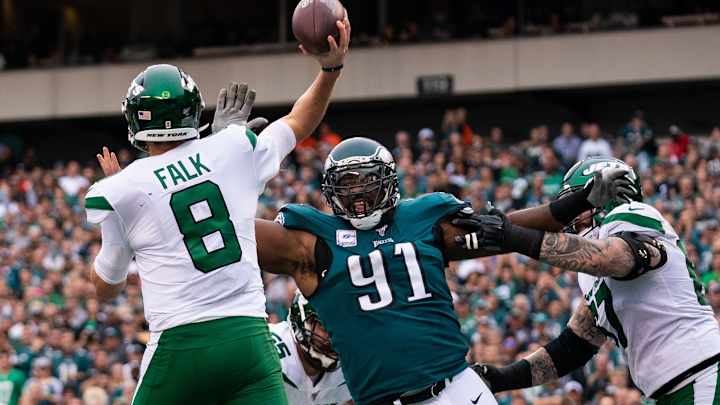Eagles Leadership Still Strong Even Without Malcolm Jenkins

The Eagles’ leadership department lost a key member when safety Malcolm Jenkins was cast into free agency two months ago.
Not to worry, though, the Eagles are not in short supply in that area, especially judging by how the offseason has shaped up so far.
Quarterback Carson Wentz has the offense covered.
One could make a case that right tackle Lane Johnson does, too. Now going into his eighth season, Johnson is gearing up to host for his third annual OL Masterminds Summit and has become a podcaster this offseason with his inventive Outside the Lane podcast, which has aired five insightful episodes.
On the defense, Fletcher Cox hosted several defensive line teammates at his ranch in Texas and the group did some skeet shooting.
Fletcher Cox hosting the Eagles DLine at his ranch in Texas this week for workouts and bonding
— John Clark (@JClarkNBCS) May 30, 2020
Fletcher Cox on leadership
“I like to lead by example, just show guys that I’m here if you need me”#Eagles
🎥 @TheMalikJackson pic.twitter.com/mXX5m2IruF
Cox is one of the team’s elder statements now, along with Brandon Graham. Both were former first-round draft picks, with Cox coming in 2012 and Graham in 2010. They will lead the defense this season.
Wentz getting together with some of his receivers isn’t anything new. He is doing it again in Houston this week, with rookie Jalen Reagor and second-year receiver J.J. Arcega-Whiteside spotted in attendance. There are others, but none really too identifiable by the tweets that emerged from south Texas.
Chances are the other two rookies were there, John Hightower and Quez Watkins. Maybe newcomer Marquise Goodwin, too.
What’s different is that Wentz has really stepped up to the plate to address the racial unrest that has swept the nation in the aftermath of the death of George Floyd in Minneapolis.
Wentz was the first NFL quarterback to lend support, tweeting, in part, “institutional racism in this country breaks my heart and needs to stop.”
— Carson Wentz (@cj_wentz) May 28, 2020
Don’t think his teammates, both black and white, didn’t notice.
Quarterbacks across the NFL followed with statements of their own, as did college quarterbacks such as Clemson’s Trevor Lawrence. The most unfortunate statement, of course, was made by Saints QB Drew Brees, who drew a great deal of backlash regarding his thoughts about kneeling for the flag.
Brees has tried to make things right since, though some, like Eagles’ defensive tackle, Malik Jackson, aren’t buying the multiple apologies.
Wentz, though, double-downed on his words when he was one of more than 1,400 players from across all sports current and retired to sign a Players Coalition letter to the U.S. Congress urging the passage of a bill put forth by U.S. Representatives Justin Amash, L-Michigan, and Ayanna Pressley, D-Massachusetts.
The bill, known as the Ending Qualified Immunity Act, or the Amash-Pressley Act gives American citizens a better chance to hold public officers and officials accountable for their actions when constitutional rights are violated.
Brees also signed the letter, as did notable Eagles as Zach Ertz, Rodney McLeod, Malik Jackson, rookie Jalen Hurts.
Former Eagles Chris Long, Torrey Smith, Josh McCown, and Jenkins did as well.
The qualified immunity doctrine was introduced in 1967 by the Supreme Court, shielding police officers from liability unless they violated a “clearly established” constitutional right.
The letter to Congress from the Players Coalition read:
“It is time for Congress to eliminate qualified immunity, and it can do so by passing the Amash-Pressley bill. When police officers kill an unarmed man, when they beat a woman, or when they shoot a child, the people of this country must have a way to hold them accountable in a court of law. And officers must know that if they act in such a manner, there will be repercussions.
"A legal system that does not provide such a recourse is an illegitimate one. In their grief, people have taken to the streets because for too long, their government has failed to protect them. The Courts and elected officials alike have instead shielded people who caused unspeakable harm. Congress must not be complicit in these injustices, and it should take this important step to show that law enforcement abuse will not be tolerated."

Ed Kracz has been covering the Eagles full-time for over a decade and has written about Philadelphia sports since 1996. He wrote about the Phillies in the 2008 and 2009 World Series, the Flyers in their 2010 Stanely Cup playoff run to the finals, and was in Minnesota when the Eagles secured their first-ever Super Bowl win in 2017. Ed has received multiple writing awards as a sports journalist, including several top-five finishes in the Associated Press Sports Editors awards.
Follow kracze